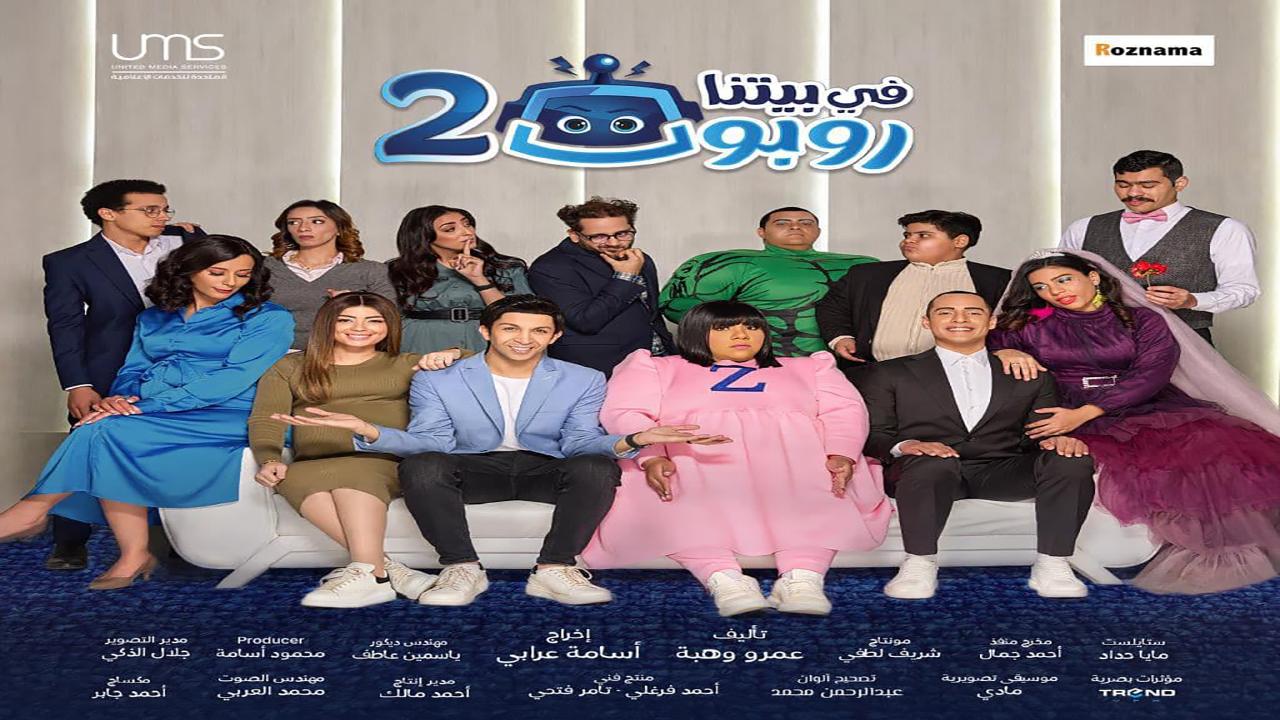
I’ve been dithering about writing about what I watched this Ramadan on Egyptian television, mainly because of how ‘little’ I watched. And most of what I watched I didn’t particularly like. Instead however I’m going to focus on the sci-fi entry for Ramadan 2022, In Our Home a Robot 2.
By Emad El-Din Aysha, PhD
This is the third consecutive year now that Egyptian television has been graced with a sci-fi series and in the peak period of intense competition of serials and soap operas; last year it was Covid-25 (horror) and the year before that it was Al-Nihaya (post-apocalypse), both not coincidentally by actor-producer Yousif Al-Sharif. This time it’s a comedy series, something that all Egyptians like and rave after.
That’s testament to the sea change going on in viewer attitudes and the fact that the entertainment industry and literary establishment in Egypt and the Arab world is finally catching up. (Turns out this series is a sequel to a previous successful series, although not broadcast in Ramadan. A series I’d never heard of before. Just goes to show you what happens when you have too much private sector television). That’s my main interest in all this, and figuring out exactly why this is happening. Not to mention picking apart the series that at the very least had its heart in the right place.
Small language point here for English readers. The expression ‘In Our Home a’ is taken from a famous Egyptian novel/movie, Fi Baytina Ragul, In Our Home a Man. The names of the two robots are Laziz and Zumba. Laziz means tasty in Arabic and Zumba is a colloquial Egyptian term meaning prank or deliberate slipup, and the names fit the two characters perfectly. Laziz is like a butler, always diligent and knowing the right thing to say and Zumba is as annoying as hell and disappoints practically around every corner. Now to the review, and vivisection!
Hard Track
The story fallows the travails of a businessman inventor named Yousef (Hisham Gamal) and his two inventions, the androids Laziz (Amr Wahba) and Zumba (Shayma Seif), as he tries to curry the favour of a big corporation so he can mass produce them. Trouble is nepotism. His corporate partners have their own inventor in mind, the incompetent Sameh (Iyad Amin), who by pure coincidence is the nephew of the CEO.
Meanwhile you have a series of personal problems, beginning with Yousef’s lovely young wife Sara (Lili Ahmed Zaher) who gets pregnant and wastes her time with the inexperienced doctor (Dina Maher), and several of his employees, including his best friend Alaa (Ahmed Desouki) and the man’s paranoid wife Lobna (Nelly Mahmoud), Yousef’s secretary Hadeer and the waiter Hadi.
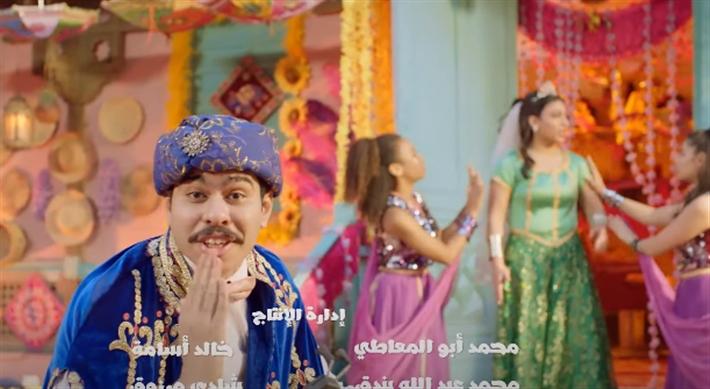
These little human asides are perfectly fine in a work of art, even SF, and since this is a comedy and in Ramadan that’s more than called for. The themes underlying this humour are even better, what I’ll deal with below. (The TV series fits in with a new tradition of lampooning that burst onto the Egyptian screen with Al-Ragul Al-Enaab, a sci-fi comedy superhero romp that came out in Ramadan in 2013. It was hilarious and trashed everything in Egyptian society, from the marriage of business and politics to family life and the mass media. SF has always been associated with satire and I’m glad it’s finally caught up with the Arab world). Again, more on this below. But that’s not the problem. The issue at hand is how badly handled it all is. The writing is bad if not non-existent at times. The introduction to the characters and their problems is very nice, at first, but there’s no follow through and storylines go all over the place and characters fall into repetition which gets old very quickly.
Typically, excellent ideas but lousy execution. It’s worse than that in fact. You felt like the producers knew they couldn’t follow through on their themes and so they deliberately wasted time. In serials you either have a summary of what happened in a previous episode or the opening scene in a current episode being the closing scene in the previous episode, but that’s all. Instead here you got the whole ‘sequence’ from the previous episode being repeated, in toto, wasting a tremendous amount of time. And you could tell they were doing this on purpose because in some cases they didn’t even repeat the closing scene from a previous episode. They started out fresh and new and filled up the episode with story and humour and action, and even some drama. There seems to be an allround crisis of writing in Egyptian television as of late, with similar bad practices like this in the past with things being thrown in willy nilly and not followed through on, just to use up time. That’s what happens when you have to have 30 episodes stretching the whole of the holy month, but a substantive story and good writer can have more than a month long set of material.
On the purely technical level the series is a mixed bag at best. The camera work was bizarre. You felt like you were watching theatre, not television. You had to squint your eyes to be able to ‘see’ the characters faces and the expressions on those faces. There were hardly any close-ups. The music was good – it seems Hisham Gamal is a singer originally – and the intro sequence was very nice and informative. The pacing of episodes is okay but not very distinguished and the series, while a comedy, can’t seem to take the opportunities hand-delivered to it, such as the sequence set in Chinatown, with Yousef desperately trying to find spare parts to fix Laziz. The gaffs and one liners generally are good but still a bit lazy. The special effects to be fair were surprisingly good, such as the scene where Yousef gets car crashed (by his wife with her lousy driving) or the contest scenes involving Laziz and Zumba, and their rival Mateen, who did a half decent job. (Mateen means tough or solid in Arabic).
On the acting front Yousef’s performance, and character, is flat and monotone. He’s relaxed and natural to be fair and can do the comedy well but doesn’t convince you he’s an inventor or businessman or is facing any real crisis situations. I guess they hired him to popularize the series, a common practice in Egyptian entertainment from the year X, thinking one kind of fame will wash off on another. Lili Ahmed Zaher as Sara doesn’t exactly give a stunning performance but she fit the attractive, superficial suburban wife to a tee, somebody that stays at home all the time and has nothing else better to do than shop, watch TV and socialise with her equals. May Diab who played her servant actually did a better and more convincing job but that’s besides the point. Ahmed Desouki was very good as the clearly recongisble lazy employee/university graduate type who just wants to get paid for having an education and only working for someone who is his friend. He’s completely natural and completely convincing, and the same goes for his philandering in the storyline. The woman playing his wife was okay but exaggerated. The waiter at the company was better and is someone to look out for in the future. Shayma Seif as Zumba is an excellent comedian but her performance was too understated here. She just played an annoying, recalcitrant robot, imitating again the lazy, blockheaded employee we all known and loath. Shorouk Ayman is a new face and attractive woman and not bad here, portraying an ignorant doctor who doesn’t even know the basics of pregnancy, as a woman let alone a profession. (She’s riding on the reputation of her more successful doctor father). The secretary is also a new comedic face to look out for, alternating her voice between girlish and brutal as her character and archetype (if not stereotype) demands.
The best actors in my opinion were Iyad Amin, the geeky goofball competitor of Yousef – another face to look out for – and then the real star of the show in my opinion, Amr Wahba as Laziz. He really convinces you he’s a robot, with his sharp birdlike motions and ability to stand perfectly still when not doing a task. His lines are executed well and he’s the main comedian here, and how good he is as an actor is highlighted by the female version of Laziz that you see at the end. He even walks like a woman in that scene, which is more than I can say for Zumba.
Now for what you’ve all been waiting for. The themes!
Comedy Central
The opening sequence alluded to above says it all. You have the hero in a Baghdad-style palace from The 1001 Nights rubbing the magic lantern only for a genie to emerge who is none other than Laziz, asking him what his wishes are. Yousef begins singing straight away that he wants a simple life without any bickering (a reference to Sara, of course) but also to be successful and well known and have his inventions becoming household names. Then you cut to his wife Sara, dressed like a princess and with darkened hair (she’s blonde in the series) saying she just wants to have a baby who’s a spitting image of Yousef, and for him to love her and buy her pretty things and take her all over the world. Then you get his friend Alaa and he says he wants a cushy job where he doesn’t have to sign in everyday (with a thumbprint scanner) and then you see his wife saying she wants him to be completely loyal to her, etc. Then you get the secretary saying she’s waiting for her prince riding the white horse to rescue her from poverty, you have the waiter saying he’ll have to suffice, the maid talking about how she wants to rest and be spoilt, and then the midwife doctor who just wants to wake up and go to sleep and never have to work or do anything, ever. This is all recognizable, the trademark laziness and lack of ambition that Egyptian businesses and the public sector both suffer from.
But there’s a twist to the tale. Yousef and his ambitions, and the fact that Laziz is the genie in the bottle, the responsive one who’s actually quite diligent and dedicated. The downright lack of ambition is something that’s actively encouraged in Egyptian cinema, television and literature, and it’s a precautionary measure most businessmen do in Arab countries to lay low and not attract attention – rivals and bureaucrats. That’s a major overhaul in Egyptian attitudes and can forgive many of the other problems in the series. Yousef bossing his employees around and making sure they aren’t wasting time eating and flirting and taking sick breaks or going home early, which is something we’re familiar with and not too impressive in itself, take on a new meaning in this thematic context.
The rest of the story is premised on this central theme of success against all odds. You have the rival inventor Sameh relying on nepotism and skullduggery – sabotaging his robots at one point or trying to steal their blueprints, with various hilarious consequences. (The episodes with him in them tend to be the best). There is the referee that Sameh’s uncle hires to adjudicate the contests between Mateen and Laziz and Zumba, and it’s a clear reference to the current state of Egyptian football and sports clubs. Mateen himself is portrayed as the boring, lazy worker type and the actor does a good job of conveying that, along with the robotic movements. The corporate head Yousef has to pander to is also interested in eliminating rivals and instead of mass producing Laziz and Zumba, to the benefit of the people, he wants to monopolize the technology and take it out of the market place. (Very true of the creative marketplace here in Egypt, from everything to patented inventions to fiction writing. IPRs are not a big deal in this part of the world). The (wasted) sequence at the Chinatown is meant to refer to the over reliance on imports because we don’t produce things domestically. Sameh describing his robot as being so badly made that it’s like he was assembled from (substandard) parts from Al-Bustan Mall also strikes an obvious chord with Egyptians. We’ve all been forced into the information age, and the rat race, and found that we have equipment and devices that are not nearly up to measure, and we still have to rely on the old-fashioned system of having a friend or relative to get you a proper gizmo from abroad. (You even see this here with the annoying relative of Sara’s who comes back from the Gulf, the only difference this time being that he’s got phony, cheap items with him).
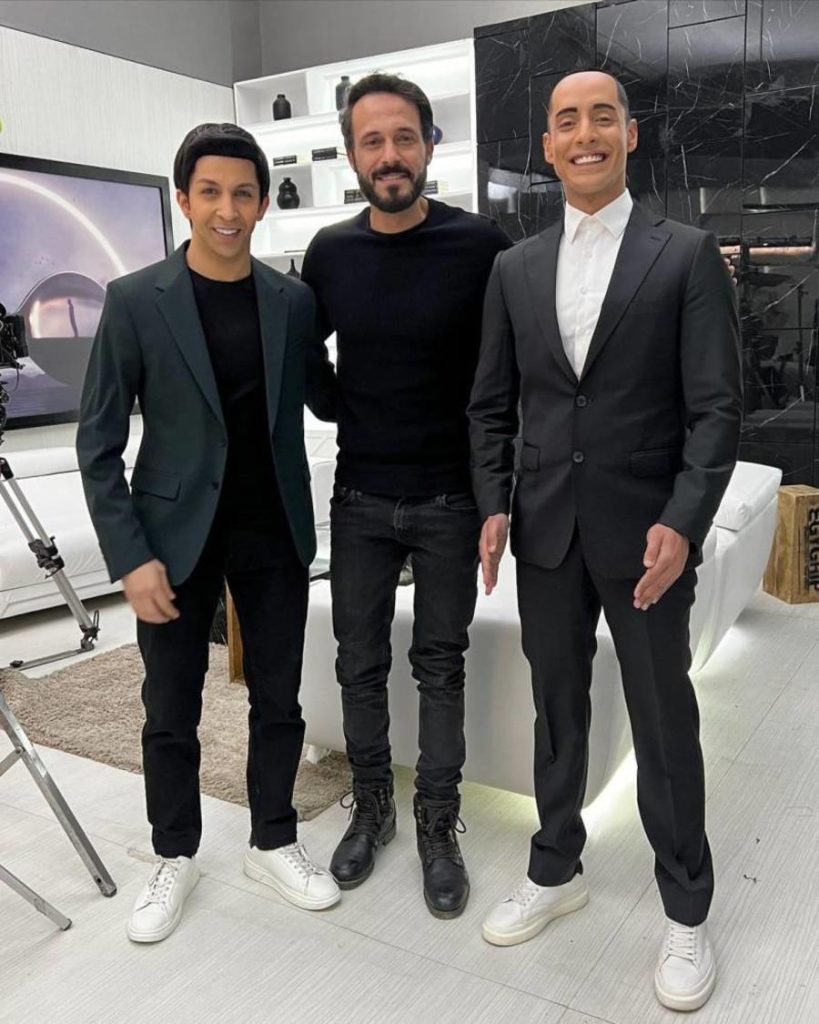
There’s more generalized social commentary here too. Sara wants to name their kids after a series of posh, pompous names and Yousef correctly points out that this (long) list of names are actually names of compounds. Her doctor is also a recognizable character, with her own satellite channel to get people to buy her recipes and books, using get togethers of pregnant women to make even more cash. (The gag with the wooden plaque, supposedly from her YouTube fans, was especially funny). The secretary Hadeer with the harsh voice and too much makeup is a reference to women having to be men and women at the same time, having to work for a living in an uncertain world where men either can’t make enough money by themselves or want to keep all that money to themselves because they aren’t real men.
When Laziz comes over to ask for her hand, she actually asks him if he wants her to stay at home once they get married. (He tells her instead he wants her to shut up). In one of the many adventures in the story you have Yousef and co being kidnapped by southern Egyptians – I think they were imitating another Ramadan serial here – hell bent on a vengeance killing, and the goons keep her while letting everyone else go because they think she’s a man!
Thermometers
The TV series, despite its many flaws, represents a grassroots change in Egyptian attitudes and expectations. Science fiction is becoming commonplace because science is becoming commonplace, and I’d wager that’s a product of information and telecommunications revolution. Mobile phones have become ubiquitous and with that all of the applications that allow you to do this and that, speeding up your sense of time and technological empowerment. Technology isn’t something far away, happening in the West, that may or may not affect us from afar. It’s here and now and setting the whole pace of life for us. The way we pay our bills, send documents to each other, receive money, register for things. It’s all changing and an increasing pace and the terminology of computers and high tech is becoming commonplace.
That doesn’t change basic tenets of life such as the family unit or backstabbing business rivals, but it’s a step forward. The genie in the bottle is science and technology, not magic and the supernatural any more. I remember a Samir Ghanem play once where you have a spaceship, a flying saucer, landing on earth in the opening sequence. Only for the saucer to open and for angels to come. In our modern history we turn science into magic. Here the tide finally seems to be reversing and magic is turning into science. The series does, to its considerable credit, try to strike a balance between what’s traditional and modern. Hence the obnoxious relatives of Sara that Yousef has to put up with, and him having to be ruthless and smart to survive in the wacky world of business. The final episode with Sara giving birth to triplets is meant to highlight all this, that your real wealth are your children and family and the way you bring them up, which doesn’t negate the right or need to be harsh in the workplace and force people to be ambitious and actually do their jobs right. This also means that the (negative) stereotype of the intellectual, which includes engineers and scientists and inventors in a country like Egypt, is finally beginning to abate. We need these innovative people to push society forward and create jobs and make life easier. They play an essential function and aren’t just people who are all talk. Even Sameh, the rival inventor, does actually want to produce things that work and while he’s not nearly as cunning and evil as he thinks he is, he isn’t a buffoon either and does occasionally score a point against Yousef.
The character of Yousef isn’t entirely new, mind you, in Egypt. There’s Adel Imam’ famous character, the cunning businessman who has to use his wits to survive, in Al-Fankoush. The difference this time around is that the businessman is somebody who is actually productive, not in the retail or entertainment sector. And the scientist in Al-Fankoush was the archetypical mad scientist too, an old geezer in a lab coat with thick glasses. Again the ubiquity of computers and smartphones is changing everything. The closing credits of the series also has a song full of computer jargon but applied to human beings, about how the hero wants to able to shut down a person and download or upload this or that straight into your head, etc. It would make life so much easier, particularly when it comes to the workforce. The times are finally catching up with Egypt and people expect things to be done quickly and precisely and if they aren’t you can expect to fail because somebody else is ahead of you in the efficiency game. We can only hope. And if Arabic science fiction can call on Arabs, and Egyptians in particular, to produce their own technologies, all the better.
The late, great and very dearly departed Ahmed Zuweil said very explicitly once that we have to stop being obsessed with getting the kids married and worried about their high school graduation and focus more on knowledge and research and experimentation. I wish they’d done a better job in the series, in terms of story and original comedy, but it’s a step in the right direction of making SF less cerebral and dystopian and more in line with lighthearted popular entertainment, and the series’s many sins can be forgiven for that.
And for that, and for that ‘only’, I salute the Ramadan producers!!





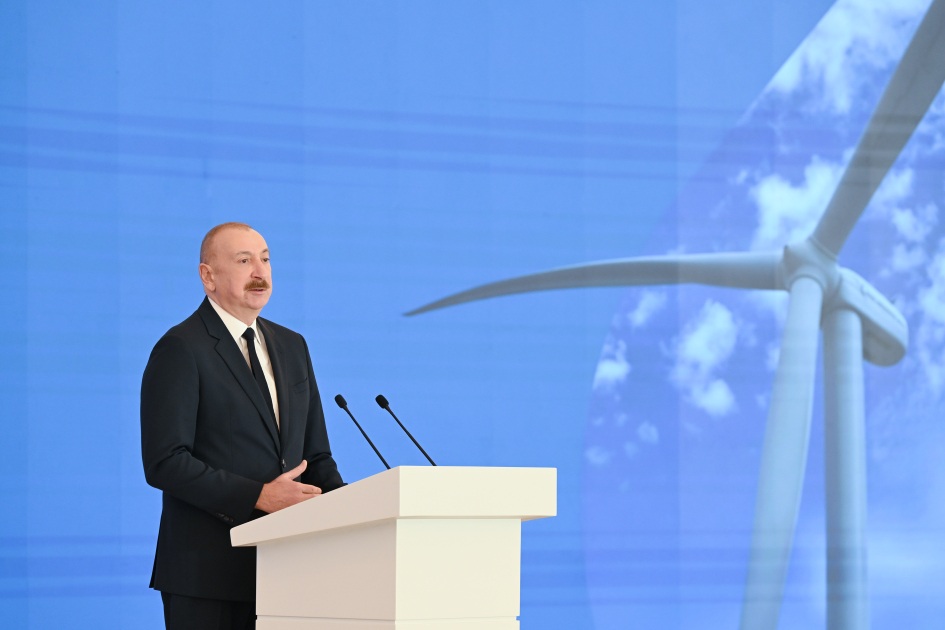
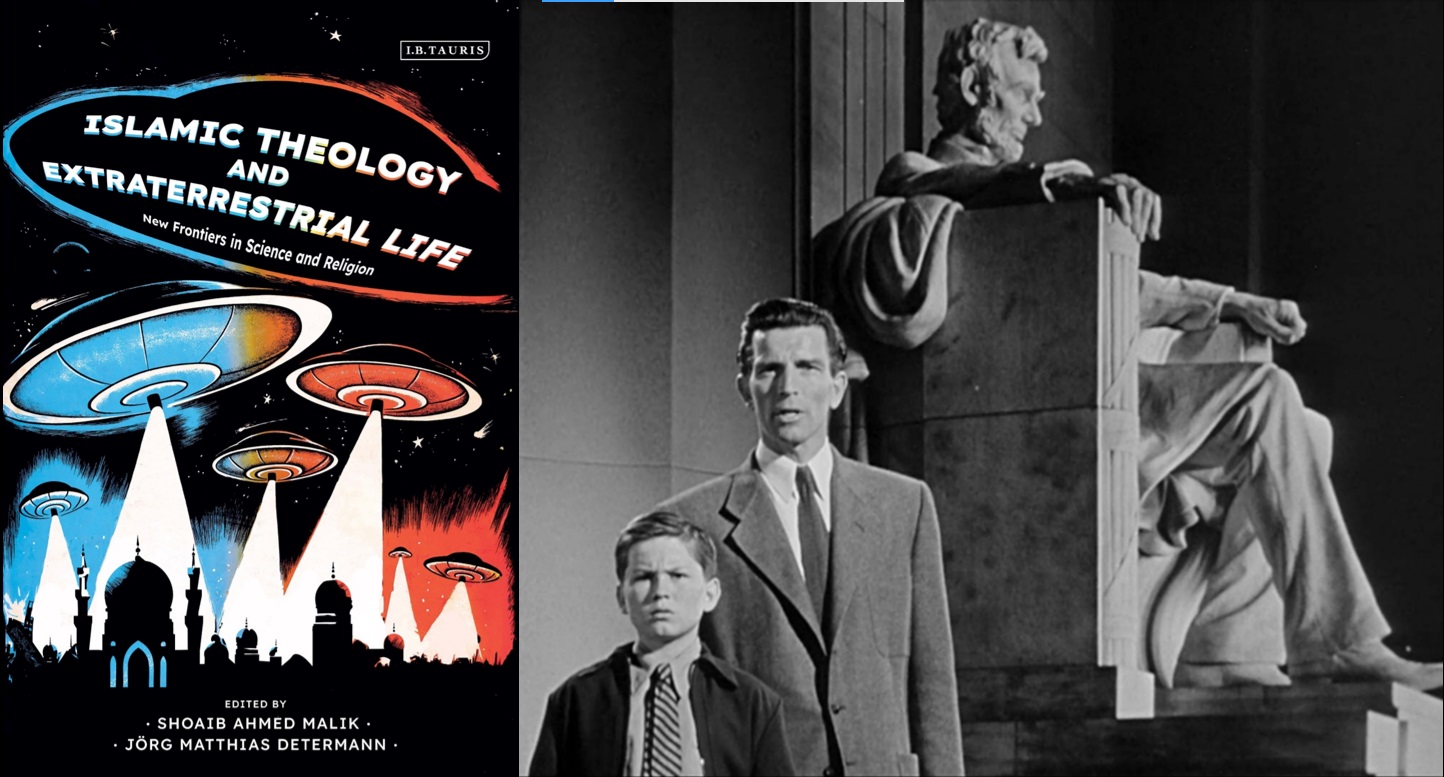
I just love to read these pieces by Mr Aysha.
Keep them coming please.
Thanks. I finally have a fan!!